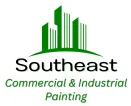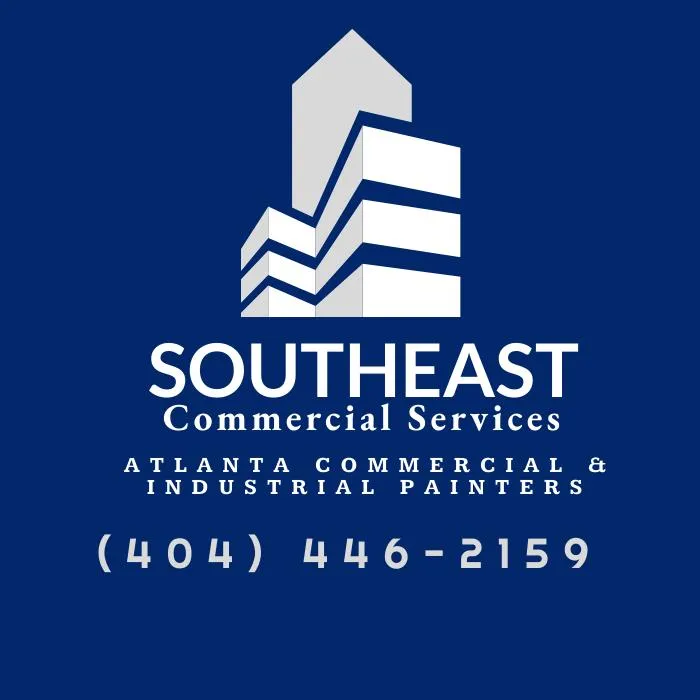Atlanta Commercial Epoxy Flooring: High-Performance Systems Engineered to Protect and Enhance Concrete Substrates
Southeast Commercial Services provides technically-driven industrial epoxy flooring solutions in the Atlanta area that mitigate operational risk, ensure facility compliance, and deliver a lower total cost of ownership through a rigorous, process-controlled installation methodology.
The Technical & Financial Consequences of Unprotected Concrete
In any industrial or commercial facility, the concrete floor slab is the most fundamental and hardest-working asset. It is the foundation of all operations. Yet, when left unprotected or sealed with an inadequate coating, its inherent material properties make it a primary point of failure. The resulting problems are not random occurrences but predictable, and often costly, outcomes of specific technical deficiencies. A professionally specified and installed epoxy flooring system is engineered precisely to counteract these vulnerabilities.

Critical Failure Point 1: Substrate Porosity and Contamination
Bare concrete may appear solid, but on a microscopic level, it is a rigid sponge. The matrix of cured cement paste is filled with a network of interconnected pores and capillaries. Through simple capillary action, this structure readily absorbs any liquid it comes into contact with, from water and cleaning solutions to oils, hydraulic fluids, and industrial chemicals. This absorption leads to deep-seated contamination of the substrate, which is nearly impossible to remove. In an automotive service bay, this means permanent oil staining and a compromised surface that cannot be properly coated later. In a food and beverage facility in Atlanta, this porosity becomes a significant compliance risk, creating a harborage for bacteria and biofilms that can jeopardize USDA, FDA, and SQF audit outcomes. An impervious epoxy system seals these pores completely, creating a monolithic, non-absorbent surface that prevents contamination before it can begin.
Critical Failure Point 2: Chemical Attack and Substrate Degradation
The strength of concrete comes from its high alkalinity (a pH typically between 12.5 and 13.5), which protects the steel reinforcement within from corrosion. Many industrial substances, particularly acids, are chemically engineered to neutralize this pH. When an acidic substance spills on bare concrete, it attacks and dissolves the calcium silicate hydrate (C-S-H) compounds that act as the binding glue of the concrete matrix. This results in a permanent loss of surface integrity, exposing the fine and coarse aggregates and leading to chronic dusting. Over time, this chemical erosion weakens the floor, reduces its load-bearing capacity, and can ultimately compromise the structural slab itself. A correctly specified chemical-resistant epoxy flooring system acts as a barrier, providing sacrificial protection against the specific chemicals used in your facility and preserving the concrete's structural integrity.
Critical Failure Point 3: Mechanical Failure Under Constant Load and Abrasion
While concrete has excellent compressive strength (resisting crushing forces), its tensile strength is remarkably low, making it brittle and susceptible to cracking under flexural stress. The daily operational demands of a busy facility—the impact from a dropped tool, the point load from a pallet jack’s wheels, the scraping action of a forklift turning—create forces that exceed the concrete's tensile limit. This leads to the formation of micro-cracks, which propagate under traffic and eventually result in spalling, chipping, and the deterioration of crucial control joints. These surface defects are not merely aesthetic; they create trip-and-fall hazards, accelerate wear and tear on expensive material handling equipment (MHE) tires, and generate airborne silicate dust, which is a known respiratory hazard. A high-build commercial epoxy flooring system distributes these impact and abrasion forces over a wider surface area, providing a durable wear layer that protects the vulnerable concrete below.
The Compounding Financial Impact of a Failing Floor
A failing floor initiates a costly and disruptive cycle of reactive maintenance. The financial impact extends far beyond the direct cost of patchwork repairs. Consider the true "cost stack" of inaction: First, there are the direct material and labor costs for temporary fixes that are destined to fail again. Second, and more significantly, is the value of lost production during unplanned downtime. Third are the soft costs—the wasted labor hours spent on excessive cleaning of a dusty, damaged floor and the potential for inventory damage from that same dust. Finally, there is the unquantifiable but significant risk of a safety incident and a subsequent workers' compensation claim or OSHA violation. The investment in a professionally installed epoxy floor is an investment in operational uptime, safety, and predictability, effectively eliminating this entire stack of compounding costs.
Commercial and Industrial Environments

Factory

Warehouse

Supermarket

Parking Deck Coatings

Aviation

Retail Facilities

Food & Beverage Production

High Heat Areas

Auto Dealerships

Restaurant

Healthcare

Office & Buildings
Why Southeast Commercial Services: Atlanta's Differentiated, Engineering-First Approach
Choosing an epoxy flooring contractor in the competitive Atlanta market is a critical decision that will impact your facility's budget and performance for a decade or more. Our value proposition is not based on selling a product from a bucket, but on delivering a meticulously engineered and installed system designed for a specific service environment. Here is what differentiates our methodology from common industry practice:
1. We Are Process-Driven Consultants, Not Just Installers
The single most common cause of epoxy flooring failure is a flawed or rushed installation process, often stemming from a superficial understanding of the client's needs. Our entire approach at Southeast Commercial Services is built upon a consultative, engineering-first foundation. Our initial site assessment is an in-depth diagnostic meeting.
2. Uncompromising Adherence to the Science of Surface Preparation
We consider surface preparation to be 90% of a successful flooring project. A tenacious bond between the epoxy system and the concrete substrate is non-negotiable, and it can only be achieved through mechanical means. Our process involves creating a specific Concrete Surface Profile (CSP) using industrial diamond grinders or captive shot blasters. All of our preparation equipment is attached to high-powered, HEPA-filtered vacuum systems to control airborne dust.
3. Deep Expertise in Industrial Epoxy Formulations and System Design
Our technical teams possess a deep, practical understanding of epoxy chemistry. This allows us to move beyond a "one-size-fits-all" mentality and select the ideal formulation for your application. We are experts in specifying and installing a complete range of epoxy technologies, including: 100% Solids Epoxies, Novolac Epoxies, and Water-Based Epoxies.
4. Meticulous Quality Control and Project Management
Our commitment to process extends through the entire installation. Our on-site crew leaders are trained to perform quality checks at every stage, from monitoring ambient conditions to verifying mixing ratios and application thickness. This meticulous attention to detail is the difference between a floor that simply looks good on day one and a floor that performs for a decade.
Our Atlanta Commercial and Industrial Epoxy Flooring Systems
Southeast Commercial Services engineers and installs multi-layer epoxy flooring systems, each tailored to specific performance and aesthetic requirements for facilities across the Atlanta metro area.
High-Build Epoxy Coating Systems (30-50 mils)
This system is the workhorse of modern industrial epoxy flooring and our most commonly specified solution for manufacturing and warehouse environments. It is a multi-layer, high-solids system built for durability. The process begins with a low-viscosity epoxy primer, followed by pigmented build coats, and finished with a high-performance urethane or epoxy topcoat. It is the ideal solution for forklift aisles, production zones, and general-purpose industrial use.
Decorative Quartz & Flake Epoxy Systems
These systems combine industrial-grade durability with enhanced aesthetic appeal. The installation involves broadcasting decorative vinyl flakes or colored quartz into a wet epoxy base coat until rejection. After curing, the floor is sealed with clear, chemical-resistant topcoats. This system is a perfect fit for Atlanta's commercial spaces, laboratories, locker rooms, healthcare facilities, and showrooms where both robust performance and a professional appearance are critical.
Chemical-Resistant Novolac Epoxy Systems
For facilities that handle aggressive chemicals, we specify novolac epoxy systems. Novolac epoxies have a unique molecular structure with high cross-link density, making them exceptionally resistant to harsh substances like 98% sulfuric acid and industrial solvents. We recommend novolac systems for secondary containment areas, battery charging stations, and chemical transfer pads.
Self-Leveling Epoxy Systems
Designed to create an ultra-smooth, "glass-like" finish, self-leveling epoxy is applied as a higher-volume liquid coating that fills minor imperfections. A notched squeegee and porcupine roller are used to achieve a flawless, monolithic finish. The resulting surface is exceptionally easy to clean, making it the ideal choice for clean rooms, pharmaceutical labs, and high-tech Atlanta facilities where maintaining a pristine environment is a primary concern.

Scheduling & Disruption Mitigation for Active Atlanta Facilities
We understand that for any active facility, operational downtime is the most significant cost. Our project management process is centered on minimizing this disruption. We specialize in developing detailed phasing plans that allow your operation to continue while we work. For example, in a large Atlanta warehouse, we can isolate and complete primary forklift aisles over a weekend shutdown. We employ strict containment protocols, using high-tack plastic barriers, zipper doors, and negative air machines to control dust and fumes, effectively protecting your sensitive equipment, inventory, and personnel from the work zone.
Frequently Asked Questions
Topic: Installation & Operational Downtime
How much operational downtime should we expect, and can the installation be done over weekends or in phases?
This is a critical concern, and we plan every project around minimizing your operational disruption. The total downtime depends on the size of the area, the specific system being installed, and the condition of the existing concrete. A typical installation can take 3-5 days from initial preparation to final cure. We specialize in working around complex operational schedules. We can execute projects in carefully planned phases, section by section, to keep critical parts of your facility running. We also frequently schedule work over weekends, holidays, and planned shutdowns to eliminate the impact on your productivity.
What about odors and VOCs (Volatile Organic Compounds) during installation? Is it safe for my employees in adjacent areas?
We prioritize workplace safety, both for our crews and your staff. While traditional solvent-based epoxies had strong odors and high VOCs, the industry has advanced significantly. The majority of our systems are 100% solids, meaning they are zero or very low-VOC. This results in minimal odor during application and curing. For areas where work must proceed adjacent to sensitive operations, we establish clear containment zones with negative air ventilation to ensure fumes do not migrate.
Topic: Safety & Compliance
How slip-resistant is an epoxy floor, and can it be customized for wet or oily areas?
An epoxy floor's slip resistance is not one-size-fits-all; it is an engineered feature. A smooth, high-gloss finish may be perfect for a cleanroom but unsuitable for a wash-down area. We can precisely control the final texture and slip coefficient by broadcasting specific aggregates (like quartz or aluminum oxide) into the coating during installation. We will work with you to meet the specific OSHA and ADA requirements for your environment, whether it's a consistently dry warehouse or a frequently wet food processing zone.
Is this flooring system compliant with USDA or FDA standards for a food and beverage facility?
Absolutely. We offer specific flooring systems that are USDA-approved and compliant with FDA regulations for food and beverage processing, pharmaceutical, and healthcare environments. These systems are seamless and non-porous, meaning they do not harbor bacteria, mold, or other contaminants. They are easy to sanitize and can withstand aggressive cleaning protocols, including hot water and steam cleaning, ensuring you can meet all necessary hygiene and safety standards.
Topic: Performance & Durability
How does the floor system handle constant, heavy forklift traffic and impact from dropped tools?
Our industrial-grade epoxy and urethane systems are designed specifically for these challenges. For heavy traffic, the key is compressive strength—the floor's ability to resist crushing under heavy loads. Our systems far exceed the strength of bare concrete. For impact resistance, we often recommend a urethane cement system, which has greater flexibility and energy absorption than a standard rigid epoxy, making it ideal for areas where heavy tools, parts, or pallets might be dropped.
What is the system's resistance to chemical spills and thermal shock?
This is determined by the topcoat of the system. We will select a topcoat specifically formulated to resist the chemicals used in your facility, whether they are acids, alkalis, solvents, or oils. For areas subject to "thermal shock," such as hot water washdowns or steam cleaning, a standard epoxy can crack or delaminate. In these situations, we specify a polyurethane cement slurry system, which is designed to expand and contract with the concrete slab, giving it superior resistance to damage from rapid temperature changes.
Topic: Maintenance & Customization
What does a routine cleaning and maintenance program actually involve?
A proper maintenance program is simple and cost-effective. The goal is to remove abrasive grit (sand, dirt) that can dull the floor's finish over time. Daily: Dry dust mopping or sweeping is often sufficient. Weekly/As Needed: Mop the floor using a dual-bucket system and a pH-neutral cleaning solution. Harsh, acidic, or highly alkaline cleaners (like citrus-based cleaners or degreasers) are unnecessary and can damage the finish over time. Spills: Address all spills promptly. The non-porous surface makes cleanup fast and easy. We provide a detailed maintenance guide upon project completion to ensure your team knows exactly how to care for the new floor to maximize its service life.
Can you embed safety lines, walkways, and company logos directly into the floor?
Yes. Embedding markings within the flooring system is far superior to applying tape or topical paint, which quickly peels and wears away. We can integrate permanent, crisp lines for pedestrian walkways, forklift lanes, and safety zones in highly visible OSHA-compliant colors. We can also embed complex graphics, including company logos, directly into the floor for a professional, durable finish that enhances both safety and branding.
Trust, Compliance & Certifications
Safety & Compliance
All projects adhere to strict OSHA safety standards in active industrial environments.
Manufacturer Certified
Our teams are highly-trained and certified to install systems to precise specifications.
Fully Insured
Carrying comprehensive liability and workers' comp insurance for all Atlanta area projects.
Warranties
Providing meaningful, written warranties covering both materials and workmanship.
Schedule Your Technical Site Assessment for Atlanta Commercial Epoxy Flooring
The first step toward a long-term, high-performance flooring solution is a technical evaluation. Stop the cycle of reactive floor repair. Contact Southeast Commercial Services to schedule a comprehensive site assessment for your Atlanta-area facility. Our flooring specialist will analyze your operational conditions, conduct preliminary substrate testing, and provide a detailed system recommendation and project plan engineered for your specific needs.
Request a Consultation




